Created in 2010 by the Galp Foundation, these educational projects have already benefitted more than 1.5 million students, almost 1,600 schools have signed up, and over 900 projects have been developed for assessment by the panel of jurors.
150 projects were submitted to the Galp Foundation from among the 1,437 schools involved this academic year. The best 15 were rewarded with a place in the final, held on the same day as the celebrations for World Energy Day, May 29. The students made a pitch deck presentation of the solutions they developed over the year. Each project category featured five finalists, only one of which would be proclaimed the winner.
These solutions are split into three official categories: Mission Up, involving 1st cycle primary school students; Power Up, designed for 2nd and 3rd primary school cycle students; and Switch Up, for secondary education students.
The students were challenged to adapt their initiatives and projects to the Sustainable Development Goals, comprising the following topics: Energy Transition, Sustainable Mobility, Technology and Innovation and Social Entrepreneurship. The primary goal of this initiative is to promote students´ development and to raise their awareness with regard to changing their attitudes and behaviour with a view to improving sustainable consumption at school, at home and in the surrounding community.









In the Switch Up category, the panel of jurors awarded first place to the prototype designed by 11th year students from the ATEC Training Academy, in Palmela. This project consists of the development of a product designed to use the flow of water from the school´s drainage systems to generate electricity and increase energy efficiency.
The winning project in the Power Up category, aimed at 2nd and 3rd cycle primary school students, was designed by 7th year students from the International School of Palmela and involved the production of recycled paper and natural fertiliser for plants, putting into practice the idea of a circular economy, where there is no waste.

